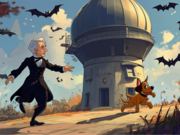多么
Characters and words in 多么
many; much / too many; in excess / (after a numeral) ... odd / how (to what extent) (Taiwan pr. [duo2]) / (bound form) multi-; poly-
多
=
夕
:
Mnemonic symbol: Immanuel "Many" Kant.
Many (多) and Doggy Dog (du) have great fun chasing a bat (夕) in front of the observatory (o1). After a while there are two bats (多), and it's not so easy to chase them any more. Suddenly there are more and more (多) bats! Now Many and Doggy Dog experience what it is like to be chased for a change.
Many (多) and Doggy Dog (du) have great fun chasing a bat (夕) in front of the observatory (o1). After a while there are two bats (多), and it's not so easy to chase them any more. Suddenly there are more and more (多) bats! Now Many and Doggy Dog experience what it is like to be chased for a change.
youngest / most junior / tiny / one (unambiguous spoken form when spelling out numbers, esp. on telephone or in military) / one or ace on dice or dominoes / variant of 吆[yao1], to shout
Words with 多么
多么
is not used as a component in another word.
Sentences with 多么
多么 currently does not appear in any sentence.
